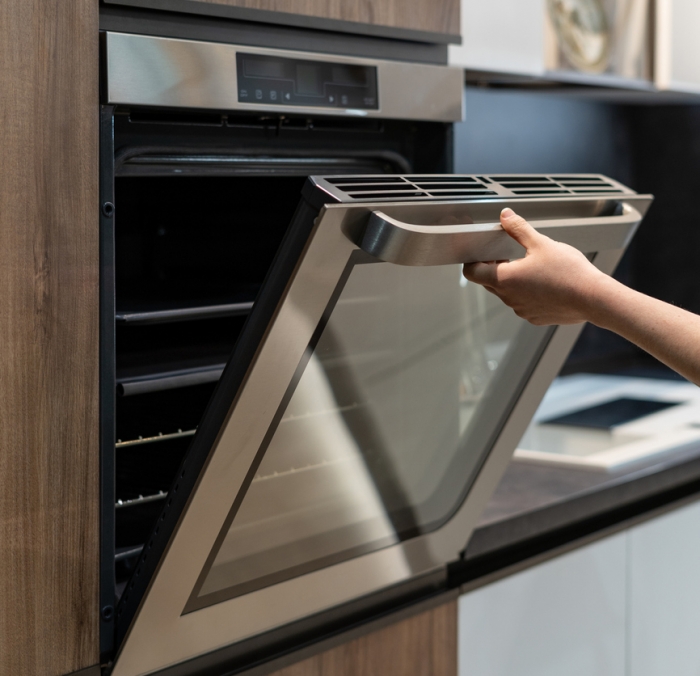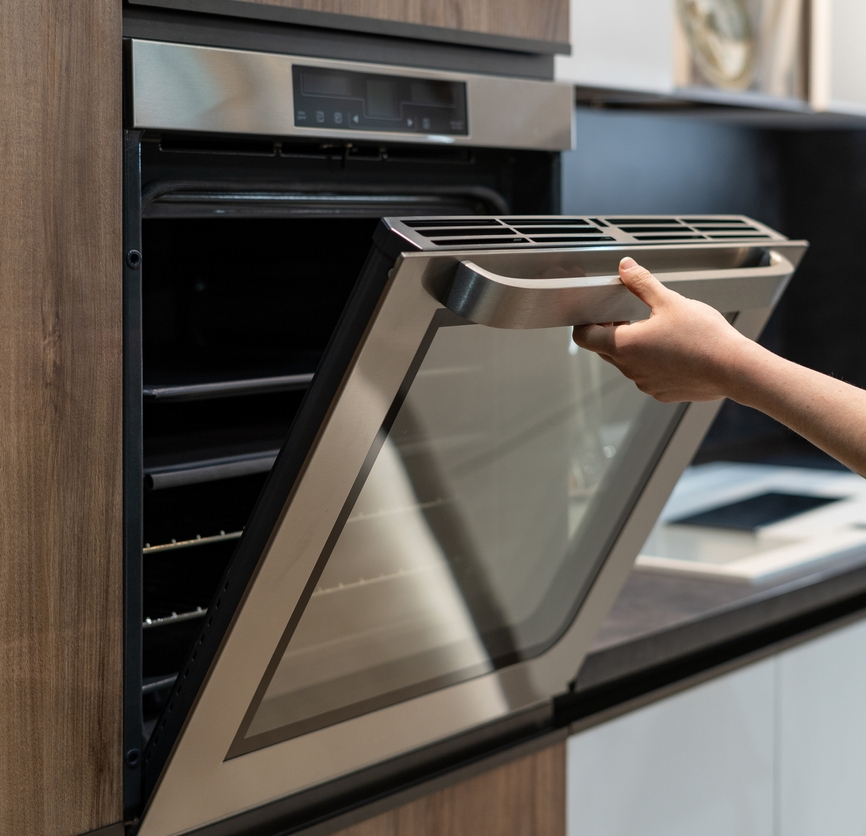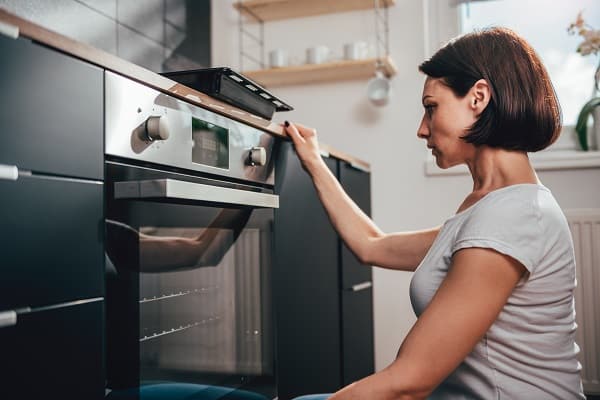Introduction To Oven Safety

Oven safety is a crucial aspect of maintaining a safe and healthy environment in the kitchen. While self-cleaning ovens are convenient, there are often concerns and misconceptions about their safety. Understanding the workings of these ovens and the potential risks involved is essential for using them properly. This article aims to debunk myths surrounding self-cleaning ovens and provide practical tips for safe oven use. By clarifying the risks and promoting informed practices, individuals can confidently enjoy the benefits of self-cleaning ovens without compromising their health and safety.
Overview Of Common Concerns About Self-cleaning Ovens
Common concerns about self-cleaning ovens revolve around the potential dangers and risks associated with their use. One major concern is the exposure to fumes and odors emitted during the cleaning cycle, which some believe can be harmful to health. Another concern is the potential hazards if safety precautions are not followed, such as the oven reaching high temperatures or malfunctioning during the cleaning process. Additionally, there are misconceptions about the effects of self-cleaning ovens on the quality of food cooked in them. Understanding these concerns is vital for taking appropriate safety measures and debunking any myths surrounding self-cleaning ovens.
Why Understanding Oven Safety Is Important
Understanding oven safety is crucial for ensuring the well-being of yourself and your family. By being knowledgeable about the potential risks and hazards associated with self-cleaning ovens, you can take necessary precautions to prevent accidents and protect your home. It is important to be aware of the proper use and maintenance of these appliances to avoid any damage or malfunctions. Additionally, debunking myths about self-cleaning oven dangers helps promote informed practices and dispel unnecessary fears. By prioritizing oven safety, you can maintain a safe and comfortable cooking environment in your home.
Understanding Self-cleaning Ovens

Self-cleaning ovens are designed to make the cleaning process easier and more convenient for users. These ovens utilize a high-temperature cleaning cycle that can reach temperatures as high as 900 degrees Fahrenheit. During this cycle, the oven heats up to incinerate any food particles and spills, reducing them to ash. Once the cycle is complete, the residual ash can be easily wiped away with a damp cloth. Self-cleaning ovens also have safety features, such as a locking mechanism to prevent access to the hot oven during the cleaning process. It is important to understand how these ovens work and follow the manufacturer’s instructions to ensure safe and effective operation.
How Self-cleaning Ovens Work
Self-cleaning ovens work by utilizing a high-temperature cleaning cycle. These ovens are designed with a special heating element that can reach temperatures as high as 900 degrees Fahrenheit. During the self-clean cycle, the oven heats up, causing any food particles and spills to be incinerated and reduced to ash. This intense heat helps to remove stubborn residue and stains, making the oven easier to clean afterwards. The residual ash can be easily wiped away with a damp cloth once the self-clean cycle is complete. It is important to follow the manufacturer’s instructions to ensure safe and effective operation of self-cleaning ovens.
Debunking Myths About Self-cleaning Oven Dangers
There are several myths surrounding the dangers of self-cleaning ovens that need to be debunked. One common misconception is that the fumes produced during the cleaning cycle are toxic and can harm your health. However, self-cleaning ovens are designed to safely handle high temperatures and the fumes are typically not harmful. Another myth is that self-cleaning ovens can cause fires. While it is important to follow safety precautions and not leave the oven unattended during the cleaning cycle, the risk of fire is minimal. Understanding the reality of these myths can help alleviate unnecessary concerns about self-cleaning oven dangers.
Risks Associated With Self-cleaning Ovens

There are some risks associated with using self-cleaning ovens, but they can be minimized with proper usage and precautions. Exposure to fumes and odors during the cleaning cycle may cause discomfort for some individuals, but the fumes are typically not harmful. However, it is important to ensure proper ventilation during the cleaning process. Additionally, if safety precautions are not followed, such as leaving the oven unattended or not properly removing large food debris, there is a potential for fire hazards. It is crucial to read the manufacturer’s instructions and take necessary safety measures to reduce these risks.
Exposure To Fumes And Odors During The Cleaning Cycle
During the self-cleaning cycle, self-cleaning ovens generate fumes and odors that can be unpleasant and uncomfortable for some individuals. These fumes are produced as the oven reaches high temperatures to burn off food particles and residues. Although the fumes are not typically harmful, they can cause discomfort, such as headaches or eye irritation. It is important to ensure proper ventilation in the kitchen by opening windows or using exhaust fans to reduce the concentration of fumes. Following manufacturer’s instructions and using the oven in a well-ventilated space can minimize the discomfort caused by the fumes.
Potential Hazards If Safety Precautions Are Not Followed
Not following safety precautions when using self-cleaning ovens can lead to potential hazards. These include:
- Fire hazards: Self-cleaning ovens reach high temperatures to burn off food particles and grease. If flammable materials are left inside the oven or if the oven is not properly ventilated, it can result in a fire.
- Damage to the oven: Using the wrong cleaning agents or abrasive materials can damage the oven’s interior. This can lead to costly repairs or the need for a replacement.
- Exposure to toxic fumes: The self-cleaning process produces fumes that can be harmful if inhaled. These fumes contain chemicals that can cause respiratory irritation or other health issues if proper ventilation is not maintained.
To avoid these hazards, it is crucial to follow the manufacturer’s instructions, remove any flammable materials, ensure proper ventilation, and use appropriate cleaning agents. Taking these safety precautions will help protect both the oven and those using it.
Misconceptions About Oven Safety

There are several common misconceptions about oven safety that need to be addressed. One of these is the belief that self-cleaning ovens are health hazards. In reality, the fumes produced during the self-cleaning process are only harmful to tropical birds, not humans or typical house pets. Another misconception is that self-cleaning ovens can cause fires. While it is true that improper use or failure to follow safety precautions can pose fire hazards, when used correctly, self-cleaning ovens are safe and effective. It is important to separate fact from fiction when it comes to oven safety to ensure the well-being of both users and the appliance itself.
Common Myths About Self-cleaning Ovens And Their Effects
There are several common myths surrounding self-cleaning ovens and their effects. One of the most prevalent myths is that the fumes produced during the self-cleaning process can be harmful to humans. However, this is not true. The fumes are only harmful to tropical birds, not to typical house pets or humans. Another myth is that self-cleaning ovens can cause fires. While improper use or failure to follow safety precautions can pose fire risks, when used correctly, self-cleaning ovens are safe and effective. It is important to dispel these myths and promote accurate information about oven safety.
Clarifying The Risks Versus The Reality
When it comes to self-cleaning ovens, there is often a confusion between the risks associated with them and the reality of their safety. While it’s true that improper use or failure to follow safety precautions can pose risks such as fire hazards, it’s important to clarify that when used correctly, self-cleaning ovens are safe and effective. The fumes produced during the self-cleaning process are only harmful to tropical birds, not to humans or typical household pets. By understanding the proper usage and taking necessary safety measures, individuals can enjoy the convenience of self-cleaning ovens without any harm.
Tips For Safe Oven Cleaning

When it comes to cleaning your oven safely, there are a few tips to keep in mind. Here are some best practices to ensure a safe cleaning process:
- Read the manufacturer’s instructions: Before starting the self-cleaning cycle, carefully read the oven’s instruction manual to understand the specific guidelines and recommendations.
- Remove any loose debris: Before initiating the self-cleaning function, remove any loose debris, such as food crumbs or grease, from the oven interior to prevent excessive smoke or odors.
- Ventilate the area: Ensure proper ventilation by opening windows or turning on exhaust fans while the oven is in the self-cleaning mode. This will help dissipate any fumes or odors that may be emitted during the process.
- Keep flammable materials away: Remove any flammable objects, such as oven mitts, plastic utensils, or cleaning materials, from the oven area to reduce the risk of fire hazards.
- Monitor the process: While the oven is self-cleaning, keep a close eye on it to ensure everything is functioning properly and to address any issues immediately.
- Clean up any remaining residue: Once the self-cleaning cycle is complete and the oven has cooled down, wipe away any remaining residue or ash using a damp cloth or sponge. Avoid using abrasive cleaners that may damage the oven’s surface.
By following these tips, you can safely clean your oven and maintain its optimal performance without any harm. Always prioritize safety and take necessary precautions to protect yourself and your home.
Best Practices For Using Self-cleaning Ovens
When using a self-cleaning oven, it is important to follow some best practices to ensure safety and optimal performance. Here are some tips to keep in mind:
- Read the manufacturer’s instructions: Familiarize yourself with the specific guidelines and recommendations for your oven model.
- Remove any loose debris: Clear out any food crumbs or grease before starting the self-cleaning cycle to prevent excessive smoke or odors.
- Ventilate the area: Open windows or turn on exhaust fans to dissipate any fumes or odors emitted during the cleaning process.
- Keep flammable materials away: Remove any flammable objects, such as oven mitts or plastic utensils, from the oven area to minimize fire hazards.
- Monitor the process: Keep an eye on the oven during the self-cleaning cycle to ensure everything is functioning properly and address any issues immediately.
- Clean up remaining residue: After the self-cleaning cycle is complete and the oven has cooled down, wipe away any remaining residue or ash using a damp cloth or sponge. Avoid using abrasive cleaners that may damage the oven surface.
By following these best practices, you can safely and effectively clean your oven without any harm.
Safety Measures To Protect Yourself And Your Family
When using a self-cleaning oven, it is essential to take necessary safety measures to protect yourself and your family. Here are some important steps to follow:
- Ensure proper ventilation: Open windows or turn on exhaust fans to allow any fumes or odors to dissipate.
- Keep children and pets away: Restrict access to the kitchen area while the oven is undergoing the self-cleaning cycle to avoid any potential accidents or injuries.
- Use protective gear: Consider wearing gloves and a mask to minimize any potential exposure to fumes or dust.
- Follow timing guidelines: Stick to the recommended cleaning time specified by the manufacturer to prevent overexposure or potential damage to the oven.
- Be prepared for emergencies: Have a fire extinguisher nearby and familiarize yourself with its operation in case of any unforeseen incidents.
By following these safety measures, you can ensure a safer environment while utilizing the self-cleaning function of your oven.
Conclusion

In conclusion, debunking the myths surrounding self-cleaning ovens is important for understanding their safety benefits. While there have been concerns about fumes and potential hazards, proper usage and following safety measures can mitigate these risks. Self-cleaning ovens provide a convenient and efficient way to maintain a clean and hygienic kitchen environment. By ensuring proper ventilation, keeping children and pets away, using protective gear, following recommended timing guidelines, and being prepared for emergencies, users can safely utilize the self-cleaning function without fear. Overall, self-cleaning ovens are a valuable tool in maintaining a safe and healthy home.
Key Takeaways On Self-cleaning Oven Safety
- Proper usage and following safety measures can mitigate risks associated with self-cleaning ovens.
- Ensure proper ventilation during the cleaning process to prevent the buildup of fumes.
- Keep children and pets away from the oven during the self-cleaning cycle.
- Use protective gear, such as gloves and goggles, to prevent contact with cleaning chemicals.
- Follow the recommended timing guidelines provided by the manufacturer.
- Be prepared for emergencies, such as a fire, and know how to safely extinguish it.
- By adhering to these precautions, self-cleaning ovens can be a valuable and safe tool in maintaining a clean and hygienic home.
Dispelling Myths And Promoting Informed Practices
Dispelling myths and promoting informed practices is essential when it comes to self-cleaning oven safety. It is important to debunk common misconceptions surrounding the dangers of self-cleaning ovens and educate users on the proper usage and safety measures. By providing accurate information and guidelines, individuals can understand the risks versus the reality of using self-cleaning ovens. This knowledge empowers users to make informed decisions and take necessary precautions to ensure their safety and the safety of their family. Promoting responsible practices will help create a safer cooking environment and prevent accidents or damage to the oven.
FAQ About Can Self Cleaning Oven Kill You: Debunking Myths About Oven Safety
Q: Are self-cleaning ovens dangerous to use?
A: Self-cleaning ovens are designed to operate safely when used according to the manufacturer’s instructions.
Q: Can a self-cleaning oven emit toxic fumes that are harmful?
A: While self-cleaning ovens can produce heat and some odor during the cleaning cycle, they are not known to emit toxic fumes that pose a significant danger to health.
Q: Is it safe to leave the house while a self-cleaning oven is in operation?
A: It is not recommended to leave the house unattended while a self-cleaning oven is running, as it’s always best to monitor any appliance in case of unexpected issues.
Q: Can a self-cleaning oven cause a fire?
A: Self-cleaning ovens are equipped with safety features to prevent fires, such as automatic shut-off mechanisms in case of overheating. However, it’s essential to always follow safety guidelines and never misuse the appliance.
Q: Are self-cleaning ovens safe for households with pets or children?
A: As with any household appliance, precautions should be taken when using a self-cleaning oven around pets or children. It’s advisable to keep them away from the oven during the cleaning cycle and ensure proper ventilation in the kitchen.

Marine Bay Restaurant received the International Food Culture Award 2019 as the Best Szechuan & Hunan Restaurant, enjoying a reputation in North America. Renowned for the tunnel, authentic, and cheap. Known as “Human Taste First Garden,” 2013 Vancouver culinary first book named “Best Chuan Xiang Outlets,” significant temperature and China Eastern Airlines designated outlets.